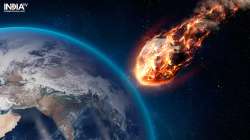ALERT: Asteroid as tall as Burj Khalifa to fly past Earth next month
A word of caution! An asteroid as tall as the world's tallest building, Burj Khalifa, is set to fly past Earth next month. This definitely sounds scary! According to the Centre for Near Earth Object Studies (CNEOS), asteroid 2000 QW7 will zip past the third rock from the Sun on September 14.

A word of caution! An asteroid as tall as the world's tallest building, Burj Khalifa, is set to fly past Earth next month. This definitely sounds scary! According to the Centre for Near Earth Object Studies (CNEOS), asteroid 2000 QW7 will zip past the third rock from the Sun on September 14.
What is asteroid 2000 QW7:
2000 QW7 asteroid is massive. It is estimated to be between 290 and 640 meters (951 and 2,132 feet) making it significantly larger than the Empire State Building and the Washington Monument combined.
The 2000 QW7 asteroid will fly past earth at a speed of 14,361 mph and will pass within 0.03564 astronomical units of our planet, or approximately 3.3 million miles.
The space rock is known as a near-Earth object. "Potentially hazardous" NEOs are defined as space objects that come within 0.05 astronomical units and measure more than 460 feet in diameter, according to NASA.
More about asteroid 2000 QW7:
Any celestial material within 92.9 million miles is considered a near-Earth object. The Sun-orbiting asteroid passes earth roughly every 20 years and last passed by on September 1, 2000.
Can this asteroid hit earth?
NASA has said that there is no risk of the asteroid colliding with earth. However, NASA chief Jim Bridenstine had previously cautioned against a deadly asteroid in the near future.
When will an asteroid fly past earth next:
The next time an asteroid will fly past Earth will be October 19, 2038.
What do scientists say about asteroid 2000 QW7:
Scientists believe that an asteroid roughly 30 times the size of asteroid 2000 QW7 was responsible for wiping out the dinosaurs.
SpaceX CEO Elon Musk echoes NASA warning:
SpaceX CEO Elon Musk too echoed NASA's warning about the risks posed by such objects.
“Wouldn’t worry about this particular one,” Mr Musk tweeted, referring to the Apophis asteroid.
“But a big rock will hit Earth eventually and we currently have no defence.”
ALSO READ | CAUTION: Massive asteroid may hit Earth, dangerous effects possible
ALSO READ | NASA picks new teams to study Moon, asteroids